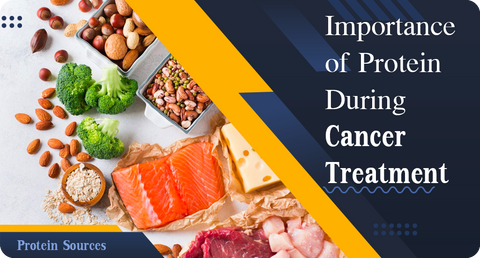Cancer is one of the leading causes of mortality and morbidity across the world. Cancer is a disease that exerts a lot of pressure and stress on both the mind and body. The treatment of cancer involving radiations therapy, stem cell transplant, immunotherapy, chemotherapy and surgery is much more stressful than the disease itself.
Good nutrition is of utmost importance for people with cancer as it forms the foundation to cope up during treatment and recovery. Muscle loss, cancer cachexia and malnutrition are commonly observed among cancer patients which might cause a negative impact on their health. It is very important to prevent malnutrition among cancer patients and regular screening is advisable.
In this article, we will specifically talk about the importance of protein for cancer patients and survivors. During cancer, energy and protein needs are increased as appetite loss and skeletal muscle loss is commonly observed. Due to loss of appetite, food intake is decreased which results in the breakdown of muscle tissue to derive energy. Adequate protein intake in the diet can alleviate this, provide support to the immune system to fight infections and also speed up the recovery rate.
It is usually advised to consume at least 1.2 grams of protein per kg body weight per day which should be distributed among all the meals. A person can consume approx. 20-30 grams protein in main meals and around 10-15 grams in snacks. The requirement may change during the presence of any additional medical condition like renal disorders and diabetes.
Muscle protein loss might affect the quality of life causing postoperative complications, toxicity post-chemotherapy, reduced physical performance and even death. Therefore, nutritional counselling is pivotal to make them understand the importance of adequate nutrition and also to understand the eating habits of the patient for planning the diet which is well-acceptable. Loss of appetite and taste changes are commonly reported by cancer patients therefore, heath drinks and protein supplements can also be given to them for oral consumption. They are an easy and convenient way to provide balanced nutrition and monitor total nutrients intake without causing abdominal discomfort.
Studies have shown significant improvements in health if protein needs are adequately met. Studies conducted by Tayek and Hunter et al found that when the parenteral nutrition of cancer patients was enriched with branched-chain amino acids, there was a noticeable increase in muscle mass and albumin synthesis in the body. Hence, a mixture of essential amino acids can also be a good nutritional intervention.
Hence, protein is one of the critically required nutrients by cancer patients. It is required to prevent muscle and weight loss, for the healing and growth of new tissues, combat infections and support recovery. Protein is found in good quantity in eggs, meat, poultry, dairy products, pulses, legumes, beans, peas, broccoli, nuts and nut butter. However, the selection of foods may vary from person to person depending upon the biochemical parameters. Proteins supplements and amino acid mixtures can address oral, enteral and parenteral needs among cancer patients and survivors. These are effective when a person finds it difficult to eat or drink due to side effects of cancer treatment like anorexia, mouth sores, metallic taste in the mouth and difficulty in swallowing or chewing. It is always better to consult a doctor or oncologist before consuming any supplement for correct guidance regarding formulation and dosages.
REFERENCES
https://www.health.qld.gov.au/
https://www.clinicalnutritionjournal.com/

